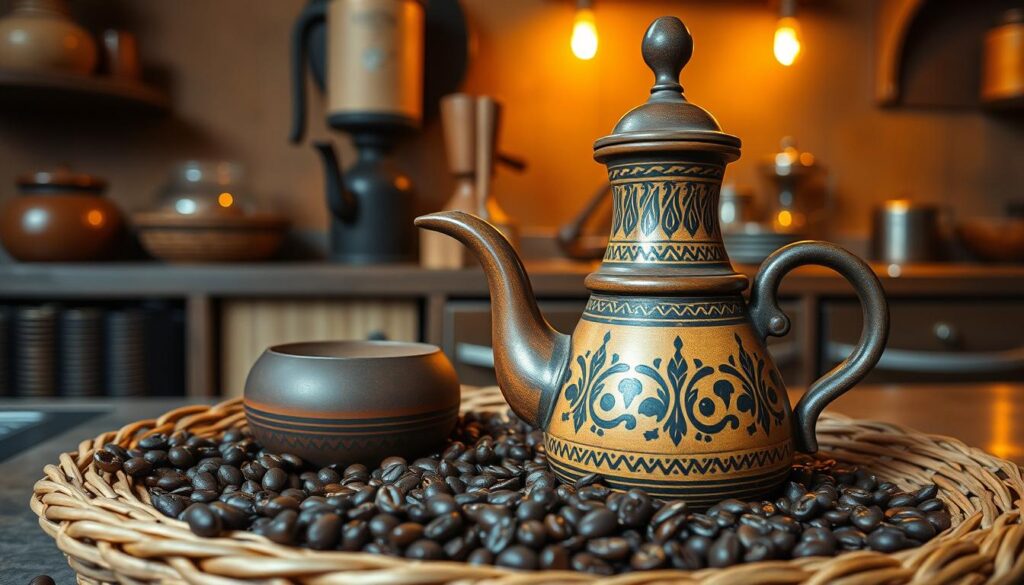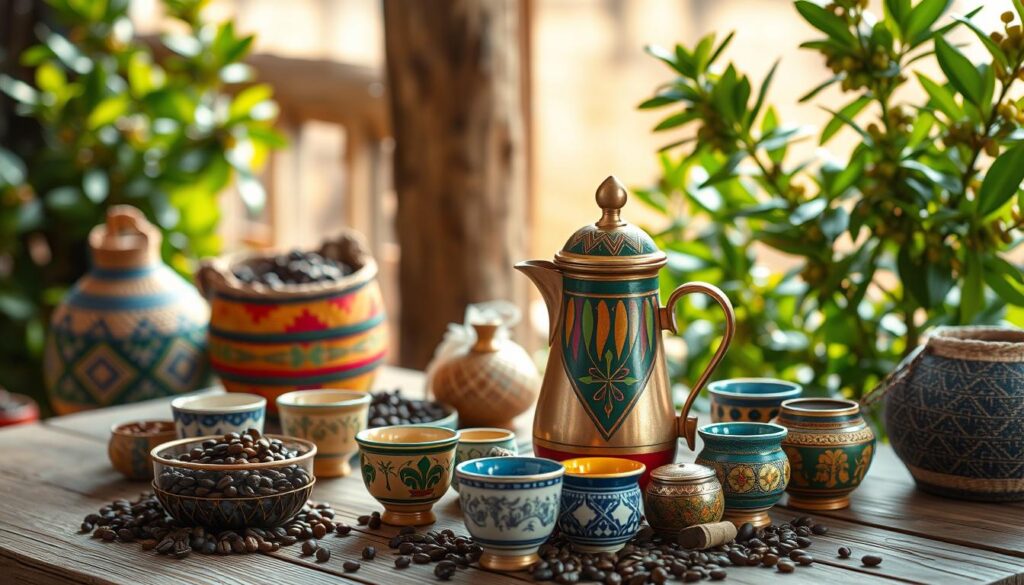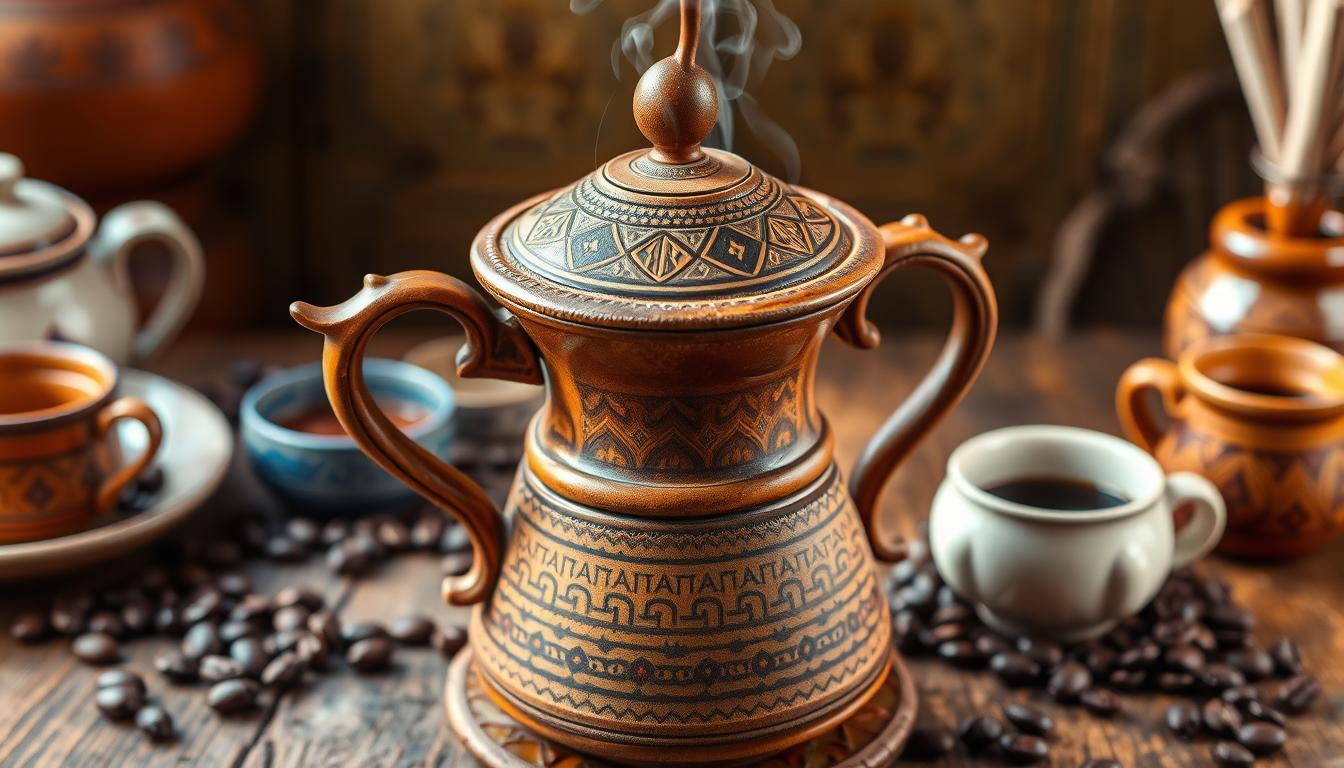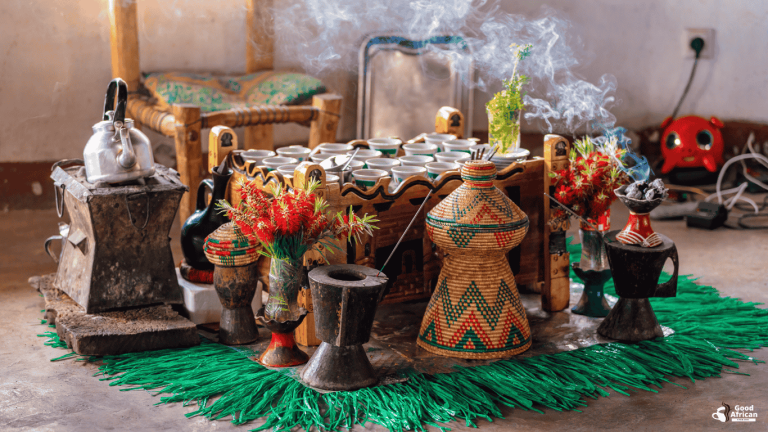Imagine walking into an Ethiopian home, where the smell of coffee fills the air. You see the jebena, a special pot used for coffee. This pot has a long history, deeply connected to Ethiopian culture.
The jebena is made from clay or pottery. It’s shaped uniquely, often black, and sometimes decorated with African designs. These pots are more than just tools; they’re family treasures, passed down through generations.
The jebena is key in the Ethiopian coffee ceremony, called “buna.” It’s a ritual that families enjoy every day. The youngest woman leads, making coffee, snacks, and incense, creating a peaceful atmosphere.
Key Takeaways
- The jebena is the traditional Ethiopian coffee pot used for brewing coffee in the country’s renowned coffee ceremony.
- These handcrafted clay or pottery vessels have a rich history dating back centuries and are often passed down as family heirlooms.
- The jebena is an integral part of the Ethiopian coffee culture, with its distinct shape and decorative designs reflecting the country’s ethnic diversity and cultural heritage.
- The Ethiopian coffee ceremony is a deeply meaningful social ritual that brings families and communities together, with the jebena playing a central role in the preparation and serving of the beloved Arabica coffee.
- The jebena symbolizes the importance of coffee in Ethiopian life, serving as a tangible connection to the country’s cultural roots and collective identity.
The Name of the Ethiopian Coffee Pot: Jebena
The jebena is a special coffee pot from Ethiopia and Eritrea. It’s key in the Ethiopian coffee ceremony. Made from clay, metal, or glass, it has a long neck, narrow spout, and a handle.
What is a Jebena?
The jebena is a medium-sized pot for brewing coffee over hot coals. Ethiopian jebenas have a separate pouring spout. Eritrean ones have a single spout for both filling and pouring. Some have straw lids and different bases.
Characteristics of a Jebena
- The jebena comes in three sizes: small, medium, and large, with capacities ranging from 7 oz to 24 oz.
- Each jebena is handcrafted and unique, with slight imperfections to be expected.
- The jebena should be cured before use by heating on all sides for up to 2 hours.
- The jebena should be hand-washed with water and mild soap, and should not be placed in a dishwasher.
Traditional vs. Modern Jebena
Traditionally, the jebena was made from clay. Now, it can also be made from metal or glass. Clay keeps coffee hot longer than metal or glass. The best way to brew coffee with a jebena is over live fire or coals.
“The jebena is not just a coffee pot; it’s a vessel that embodies the rich cultural heritage of Ethiopia and Eritrea.”

The Cultural Significance of Coffee in Ethiopia
Ethiopia is where Arabica coffee was first found. This has made coffee a big part of their culture. The Ethiopian coffee ceremony is more than just making coffee. It’s a way to connect with others every day.
Coffee Ceremony: An Essential Tradition
The coffee ceremony happens three times a day. It includes roasting, brewing, and serving coffee in a special pot called a jebena. The youngest woman in the family usually leads the ceremony. This shows how important women are in Ethiopian coffee culture.
The Role of the Jebena in Social Gatherings
The jebena is more than a pot. It stands for the shared experiences and status of the community. When people gather to drink coffee, it brings them closer together. It’s a way to build friendships and unity.
Symbolism of Coffee in Ethiopian Culture
In Ethiopia, coffee is enjoyed without milk or sugar. This lets everyone taste its full flavor. The ceremony also includes incense and snacks, making it a time for relaxation and conversation. The three rounds of coffee symbolize change, respect, and blessings. This shows how deeply coffee is valued in their culture.
Coffee is more than a drink in Ethiopia. It’s a key part of their culture, social life, and economy. The Ethiopian coffee ceremony shows how much Ethiopians love and value coffee.

“Coffee is the common man’s gold, and like gold, it enriches the person who possesses it.” – Sheik Abd-al-Kadir
Brewing Coffee with a Jebena
Brewing coffee with a traditional Ethiopian jebena is a special ritual. It’s a centuries-old method that brings joy and celebrates Ethiopia’s coffee heritage. This process not only makes a great cup of coffee but also honors Ethiopia’s rich culture.
Step-by-Step Brewing Process
To make the perfect Ethiopian coffee, start by heating the jebena. You can use hot coals or a stovetop with a ring. Measure the jebena’s volume and add the right amount of coffee and water.
Let the mixture heat up until it bubbles. Then, remove it from the heat. Pour the coffee into another container and back into the jebena. Do this 2-3 times to get the coffee just right.
Tips for Perfectly Brewed Ethiopian Coffee
For the best coffee, use fresh beans and the right water temperature. Let the grounds settle for 5-10 minutes before filtering. These steps will help you make a cup of Ethiopian coffee that’s full of flavor and aroma.
Common Mistakes to Avoid
When brewing with a jebena, avoid overheating the coffee. Make sure the grounds settle well. And always use fresh, high-quality beans. By following these tips, you’ll enjoy the full Ethiopian coffee experience.







